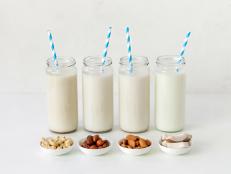Are You Getting Enough Iodine?
Here's how to tell if you’re getting enough of this mineral and where you can find it.

Aleksandr Zubkov
The mineral iodine has probably not been on your radar. You’ve probably seen the word “iodized” on your canister of table salt — it was added to salt in the 1920s to help prevent deficiency. However, lately there have been cases of iodine deficiency, and some folks may not be getting enough. Here’s how to find out if you’re getting enough of this mineral and where you can find it.
About Iodine
Iodine is a mineral needed to make thyroid hormones. These hormones control your body’s metabolism and other functions in the body. Thyroid hormones are also needed for healthy bone and brain development during pregnancy and infancy. Getting enough iodine is important for everyone, especially women who are pregnant and infants.
How Much Iodine Do You Need?
How much iodine you need depends on your age and if you’re pregnant or breastfeeding.
- Adults 18 years and older: 150 mcg
- Pregnant women: 220 mcg
- Breastfeeding women: 290 mcg
Where Can You Find Iodine?
Top sources of iodine include milk and dairy products like yogurt and cheese, as well as fish like cod and tuna, seaweed, shrimp, other seafood, and iodized salt. As a reference, 1/2 teaspoon of iodized salt has 150 mg.
Processed foods that are high in salt, like canned soups, almost never use iodized salt, which means they aren’t considered a source. Specialty salts like sea salt, kosher salt and Himalayan salt are usually not iodized. If a salt contains iodine, the label will indicate “iodized salt.”
Are You Getting Enough?
People who don’t take in enough iodine can’t make enough thyroid hormones, which can lead to many health issues. In pregnant women, it can cause fetal abnormalities including stunted growth, intellectual disability and delayed sexual development. An enlarged thyroid gland, known as a goiter, is often the first visible sign of iodine deficiency.
Recently, there have been cases of iodine deficiency in the U.S., especially in people who do not use iodized salts and instead opt for specialty salts that don’t contain iodine. In addition, if you follow a vegan diet or avoid (or eat very little) milk, dairy, seafood and eggs, you can fall short. Pregnant women need about 50% more iodine than other women in order to provide ample iodine for their baby. Research shows that many pregnant women in the U.S. may not be getting enough iodine. Many prenatal vitamins don’t contain iodine, so read the label and consult with your healthcare provider to see if a supplement may be right for you.
Bottom Line
The 2020-2025 dietary guidelines for Americans recommend getting most of your nutrients from food, including iodine. To ensure you’re getting enough iodine, opt for iodized salt, and get your three servings of milk and dairy every day, and include fish and seafood in your balanced diet. If you feel you aren’t getting enough or don’t eat the above foods, check with a registered dietitian or medical doctor to see if a supplement is needed.
We Also Recommend

































